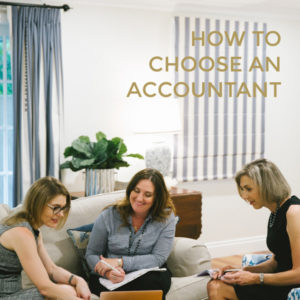the blog
WELCOME TO OUR BLOG, WE'RE EXCITED TO HAVE YOU HERE! WE HOPE THE BUSINESS ADVICE, SUCCESS STORIES AND CASE STUDIES WE SHARE WILL HELP YOU ON YOUR ENTREPRENEURIAL JOURNEY

How do you choose an accountant? Word of mouth, google search or stick with the one you have because you’ve had them for years despite not being 100% happy.
There is a difference between a tax accountant and a business advisor. A tax accountant will prepare tax returns whereas an advisor will be there to listen, understand your business, help you achieve your goals and provide advice on almost all aspects of your operations. Finding the right accountant can be a daunting task and the right accountant may change over time as your business grows and therefore your business needs change.
5 POINTS TO CONSIDER
When choosing an accountant, we suggest you consider the following.
-
Does location matter?
Many businesses and accountants are now using cloud-based technology. This means you can collaborate online and location is less of an issue. Cloud based technology means that you and your accountant can view in real time, data no matter where you are.
If you are happy to interact using technology, your accountant can be based anywhere and you are able to find someone that really understands you, your business and your industry. Wherever they are based, make sure they are an expert in the tax laws that apply to your business.
On the other hand, some clients prefer face to face meetings with their accountant or like their accountant to attend other business meetings with them. This means your search for an accountant is limited to those that are nearby or those that are willing to travel to your premises.
-
Choose a certified or chartered accountant.
Accountants are regulated by professional bodies. In Australia the two professional accreditations are Certified Public Accountants (CPAs) or Chartered Accountants (CAs). CAs are required to have completed a bachelor degree, workplace experience and a professional competence program.
CAs can also work with bookkeepers within your business. This enables you to match skills required to the work ensuring cost efficiencies.
It is wise to hire a professional accountant from the beginning. This will ensure that your structure is effective for tax purposes and asset protection, systems are setup to support growth and enables you to have a sounding board to learn the financial side of your business.
-
Experience
An accountant should have experience with not only the preparation of tax returns for similar sized businesses but should also have a proven track record of providing consulting services. Your trusted advisor will cheer your successes, provide support where needed and hold you accountable to achieve your goals. When interviewing an accountant, ask if they have experience within your market sector as this will help them understand the unique needs of your business. You should also ask if they have any larger clients to prove their ability to support and handle your growing needs over time.
Accountants should also have the capacity to provide timely and accurate financial information in order for you to make sound business decisions and manage your cashflow.
-
Find an accountant who wants to save you money.
Some accountants only complete the compliance work – BAS and tax returns. But the best accountants love to save you money. When interviewing accountants ask them how they can save you money. Money can be saved:
- Through structures
- Tax deductions
- Operational cost savings
- System efficiencies with your business
- System efficiencies between your business and the systems used by the accountant.
-
Ensure your morals and values align.
It is extremely important that you find an accountant that has similar morals and values to you and your organisation. A strong team requires respect for diversity and each person within a team will bring different traits. However, fundamentally, a team with different morals and values will not be a successful team.
FINALLY USE YOUR INTUITION
The five tips above are provided for consideration however remember to use and trust your intuition and have an understanding of what you want from your accountant. You can also ask your prospective accountant for a selection of existing clients for references.
When you have chosen your accountant, you should be sure that you trust your accountant to provide advice and that they’ll be part of your team to grow a profitable and successful business.